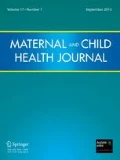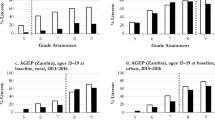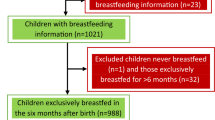Abstract
Appropriate home management can alleviate many of the consequences of diarrhea including malnutrition, impaired development, growth faltering, and mortality. Maternal cognitive ability, years of schooling, and acquired academic skills are hypothesized to improve child health by improving maternal child care practices, such as illness management. Using information collected longitudinally in 1996–1999 from 466 rural Guatemalan women with children <36 months, we examined the independent associations between maternal years of schooling, academic skills, and scores on the Raven’s Progressive Matrices and an illness management index (IMI). Women scoring in the lowest and middle tertiles of academic skills scored lower on the IMI compared to women in the highest tertile (−0.24 [95% CI: −0.54, 0.07]; −0.30 [95% CI: −0.54, −0.06], respectively) independent of sociodemographic factors, schooling, and Raven’s scores. Among mothers with less than 1 year of schooling, scoring in the lowest tertile on the Raven’s Progressive Matrices compared to the highest was significantly associated with scoring one point lower on the IMI (−1.18 [95% CI: −2.20, −0.17]). Greater academic skills were independently associated with maternal care during episodes of infant diarrhea. Schooling of young girls and/or community based programs that provide women with academic skills such as literacy, numeracy and knowledge could potentially improve mothers’ care giving practices.
Similar content being viewed by others
References
Hill, Z., Kirkwood, B. R., & Edmond, K. (2004). Family and community practices that promote child survival, growth and development: A review of the evidence. Geneva: World Health Organization.
Black, R. E., Morris, S. S., & Byce, J. (2003). Where and why are 10 million children dying every year? Lancet, 361, 26–34.
Armar-Klemesu, M., Ruel, M. T., Maxwell, M. T., Levin, C. E., & Morris, S. S. (2000). Poor maternal schooling is the main constraint to good child care practices in Accra. Journal of Nutrition, 130, 1597–1607.
Katahoire, A., Flemming, S., Sabroe, S., & Whyte, S. R. (2004). The importance of maternal schooling for child morbidity and mortality and maternal health behavior in southeastern Uganda. Journal of Health & Population in Developing Countries, Mar 9.
Glewwe, P. (1999). Why does the mother’s schooling raise child health in developing countries? Journal of Human Resources, 34(1), 125–159.
Joshi, A. R. (1994). Maternal schooling and child health: Preliminary analysis of the intervening mechanisms in rural Nepal. Health Transition Review, 4(1), 1–28.
Levine, R. A., Levine, S. E., Rowe, M. L., & Schnell-Anzola, B. (2004). Maternal literacy and health behavior: A Nepalese case study. Social Science and Medicine, 58, 863–877.
Cattell, R. B. (1963). Theory of fluid and crystallized intelligence. A critical experiment. Journal of Educational Psychology, 54, 1–22.
Kyllonen, P. C., & Christal, R. E. (1990). Reasoning ability is (little more than) working memory capacity? Intelligence, 14, 389–433.
Spearman, C. (1923). The nature of intelligence and the principles of cognition. London: MacMillan.
Spinath, B., Spinath, F. M., Harlaar, N., & Plomin, R. (2006). Predicting school achievement from general cognitive ability self-perceived ability and intrinsic value. Intelligence, 34(4), 363–374.
Sandiford, P., Cassel, J., Sanchez, G., & Coldham, C. (1997). Does intelligence account for the link between maternal literacy and child survival? Social Science and Medicine, 45(8), 1231–1239.
Wachs, T., Creed-Kanashiro, H., Cueto, S., & Jacoby, E. (2005). Maternal education and intelligence predict offspring diet and nutritional status. Journal of Nutrition, 135, 2179–2186.
Habicht, J. P., & Martorell, R. (1992). Objectives, research design and implementation of the INCAP longitudinal study. Food and Nutrition Bulletin, 14, 176–190.
Kuklina, E. V., Ramakrishnan, U., Stein, A. D., Barnhart, H. H., & Martorell, R. (2004). Growth and diet quality are associated with the attainment of walking in rural Guatemalan infants. Journal of Nutrition, 134, 3296–3300.
Gove, S. (1997). Integrated management of childhood illness by outpatient health workers: Technical basis and overview. Bulletin of the World Health Organization, 75, 7–24.
WHO. (1995). The World Health Organization’s infant feeding recommendation. Weekly Epidemiology Record, 70, 119–120.
Li, H., Barnhart, H. H., Stein, A. D., & Martorell, R. (2003). Effects of early childhood supplementation on the educational achievement of women. Pediatrics, 112(5), 1156–1162.
Raven, J. (2000). The Raven’s Progressive Matrices: Change and stability over culture and time. Cognitive Psychology, 41, 1–48.
Raven, J., Court, J., & Raven, J. (1984). Manual for Raven’s progressive matrices and vocabulary scales. London: HK Lewis.
Pollitt, E., Gorman, K. S., Engle, P. L., Martorell, R., & Rivera, J. (1993). Early supplementary feeding and cognition: Effects over two decades. Monographs of the Society for Research in Child Development, 58(7), 1–99; discussion 111–8.
Diggle, P., Heagerty, P., Liang, K.-Y., & Zeger, S. L. (2002). Analysis of longitudinal data (2nd ed.). Oxford: Oxford University Press.
Goldman, N., & Heuveline, P. (2000). Health-seeking behavior for child illnesses in Guatemala. Tropical Medicine & International Health, 5(2), 145–155.
United Nations. End Poverty 2015: Millennium Development Goals. [accessed June 2009]; Available from: http://www.un.org/millenniumgoals/.
Acknowledgements
This study was made possible through the long-lasting collaboration of the people from the four-village longitudinal study and researchers at INCAP. The authors would like to acknowledge Dr. Ann Digirolamo for assistance with psychological measures and proofreading. Funding was provided by the National Institutes of Health [R01 HD043099; R01 HD29927], the WHO Department of Child and Adolescent Health and Development [C6-181-449], the Canadian Institutes of Health Research [FGH-83074] and the Canada Research Chair’s program.
Author information
Authors and Affiliations
Corresponding author
Rights and permissions
About this article
Cite this article
Webb, A.L., Ramakrishnan, U., Stein, A.D. et al. Greater Years of Maternal Schooling and Higher Scores on Academic Achievement Tests are Independently Associated with Improved Management of Child Diarrhea by Rural Guatemalan Mothers. Matern Child Health J 14, 799–806 (2010). https://doi.org/10.1007/s10995-009-0510-1
Published:
Issue Date:
DOI: https://doi.org/10.1007/s10995-009-0510-1




